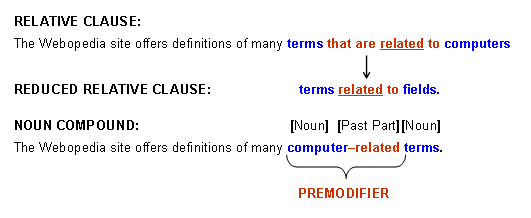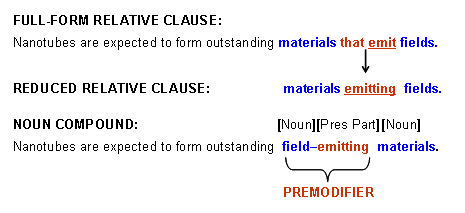|
Forming compound adjectives There are seven forms of compound adjectives that require hyphenation. All the combinations of compound modifiers listed below act as adjectives before a noun, and it is the hyphen that makes this relationship clear and helps to avoid ambiguity. 1. [ NOUN + NOUN ] + NOUN Note how the same compound noun video games is not hyphenated when it occurs alone, but requires a hyphen when it functions as an adjective before another noun:
2. [ ADJECTIVE + NOUN ] + NOUN In this example, the communication networks are not high, but rather the performance is high. In order to show that high modifies performance and not the head noun, networks, a hyphen is necessary.
3. [ NOUN + PAST PARTICIPLE ] + NOUN This use of the past participle in modifying a noun allows relative clauses to be compressed and placed before the noun. This ordering also places emphasis on the important word terms, rather than computers which would have resulted if the writer had used the relative clause. However, this strategy cannot be used with all verbs and could, if overused, violate the requirements of "light" before "heavy" elements.
4. [ NOUN + PRESENT PARTICIPLE ] + NOUN Similar to modification using a past participle, using the present participle to modify a noun allows relative clauses to be compressed and moved to a position before the noun. By doing this, the writer is able to emphasise materials rather than fields.
In the example above, note how the noun fields, which is expressed in the plural (monikko) form in the relative clauses, becomes singular (yksikkö) fieldwhen it precedes and modifies the noun materials .
5. [ ADVERB + PAST PARTICIPLE ] + NOUN Once again, a past participle allows the writer to shift elements around in the noun phrase, thus avoiding the use of the more obvious relative clause, which would have meant ending the sentence with a verb.
The only exception to this rule occurs with or adverb-adjective compound modifiers. Hyphens are generally not used in adverb-adjective compound modifiers, when the adverb ends in -ly because no such confusion is likely to occur.
6. [ NUMBER + UNIT ] + NOUN Use a hyphen when a number-unit compound comes before a noun, but not when it follows the noun.
Note that whereas the units in the number-unit expression would normally be plural when standing alone, the units must become singular and hyphenated when placed before a noun.
7. [ PHRASE ] + NOUN Phrases that premodify the noun are typically hyphenated to clarify their function as adjectives.
|
||||||||||||||||||||||||
| Finnish Virtual University / © 2004 Pennington |






